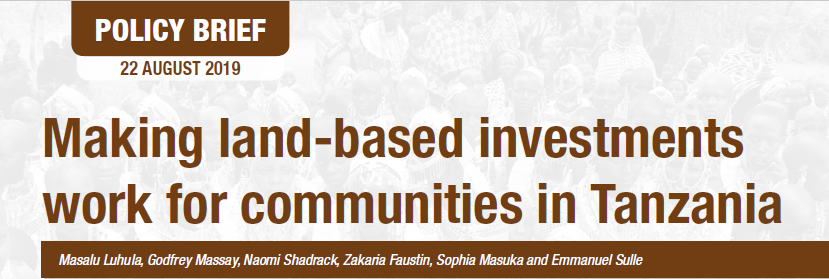Ardhi Yetu Project Plus (AYP Plus)
Ardhi Yetu Project Plus (AYP plus) is a four years project commenced from 2018 to 2021, implemented by Tanzania Natural Resource Forum (TNRF) in selected four districts in Manyara, Dodoma and Iringa regions. The project is funded by Care International in Denmark through Care International in Tanzania, with the theory of change; IF farmers and pastoralists - particularly women - are empowered to hold local authorities to account, have security to invest in land (access to land), are able to protect their investments against climate change via adaptation, receive support from strong civil society networks and organizations, and legal frameworks and institutions are responsive to land resource governance (enabling environment), THEN they will be able to sustain land ownership against external pressures, be resilient to shocks and stresses, and positively contribute to Tanzania’s economic growth.
Overall Objective: Active communities and civil society advocate for an inclusive and transparent land sector, strengthening the land tenure security and resilience of small-scale farming and pastoral communities- particularly women.
AYP plus Implementation Approaches:
TNRF implements AYP plus project using three main project approaches namely; Land Right Monitors (LRMs), Loose Coalitions of farmers and pastoralists, and district multi-stakeholders’ forum to address land based conflicts as well as climate change adaptation and resilience.
Land Right Monitors (LRMs); these are community representatives, a man and a woman who are democratically elected by villagers and intensively trained on land rights, land based conflict resolution, as well as climate change adaptation and resilience. LRMs work voluntarily to downscale the knowledge to their respective communities conducting training to the village councils, communities and engaging in resolving land conflicts by mediation, and provide legal aid by linking the to the advocates for legal aid.
The coalitions of farmers and pastoralists; With the understanding that, climate change affects both farmers and pastoralists as land user groups, TNRF adopted loose coalition fora formed for the purpose of looking into solutions in the conflicts between farmers and pastoralists. The conflicts of the two land user groups are root caused by a number of factors of which climate change has a great contribution. However, the loose coalition is taken as a platform where community can deliberate dialogue for durable alternative or solution for the conflicts that arise between the two parts.
District Multi-stakeholders’ forum (DMF); this is a dialogue comprising of different stakeholders, the dialogue begins at the very low level of community groups, village ward and District level. District level dialogue are essential due to nature and diversity of stakeholders it involves. It is at the district level where dialogue can widely involve decision makers, influencers and community members directly or through their representatives. TNRF has district multi-stakeholders’ forums in Iringa Rural, Chemba, Kilolo, Mvomero, Kilombero, Kilwa and Bagamoyo districts. This approach proved substantial impact on following up decisions and engagements for solution. Iringa Rural and Simanjiro districts adopted DMF approach in conducting Participatory Scenario Planning (PSP) which gave chance for various groups to prepare plans action plans towards resilience of effects of weather changes on livelihoods.

